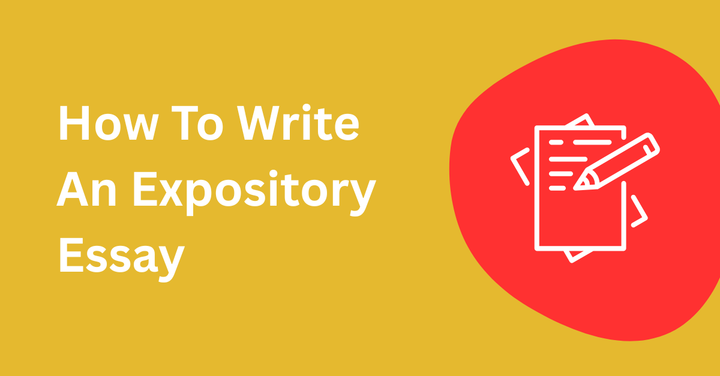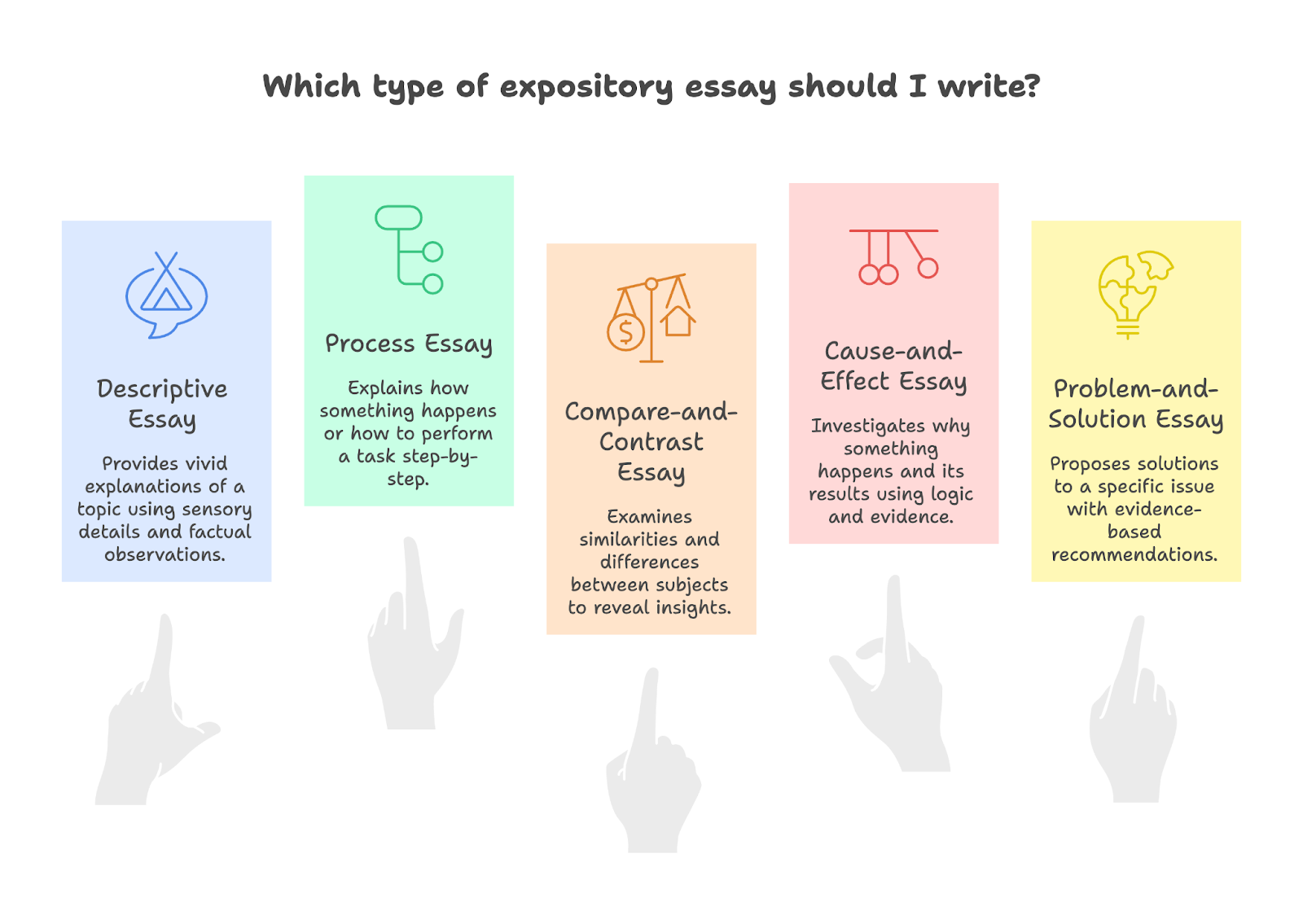How To Write An Expository Essay
An expository essay explains or analyzes information using logical reasoning. It helps readers understand a topic without bias.

If you’ve been tasked with writing an expository essay but you’re facing a blank page with no idea where to begin, you’re not alone. According to Forbes writer Laura Brown, 78% of people she interviewed said they’d struggled with writer’s block at some point.
At GPTZero, we review thousands of essays and writing samples each week through our AI detection platform, working with educators who teach writing skills across high schools and universities. From this perspective, we’ve seen what separates strong expository essays from confusing ones: a solid core argument and structure, based on evidence.
In this guide, we’ll break down how to plan and write an expository essay step by step, with examples and insights from educators who use GPTZero to promote originality and integrity in student writing. By the end, you’ll understand what an expository essay is, how to structure one, and what teachers typically expect at different education levels.
Key take aways
- An expository essay explains or analyzes information using logical reasoning. It focuses on facts over opinions, helping readers understand a topic without bias.
- Strong essays follow a consistent structure (introduction, body, and conclusion) with each paragraph developing one main idea supported by data or examples.
- As students progress from high school to postgraduate study, the expectations shift from demonstrating understanding to showing independent research and critical depth.
- To improve your writing, keep research active, plan your outline, use credible sources, and edit for transitions and flow.
What is an Expository Essay?
According to Purdue University’s Online Writing Lab (OWL), an expository essay “requires the student to investigate an idea, evaluate evidence, expound on the idea, and set forth an argument concerning that idea in a clear and concise manner.”
An expository essay is a type of academic writing designed to explain or analyze a topic in a factual and evidence-based way. Unlike an argumentative or opinion-based essay, its purpose is not to argue or entertain but to inform, as expository essays have a neutral viewpoint and are solely focused on giving a factual analysis.
This means that you use data or comparisons to explain a concept or process, with each paragraph developing one idea at a time. Typically, expository essays are used in classrooms to build critical thinking and research skills.
What Is the Purpose of Expository Writing?
The goal of expository writing is to explain an idea using factual information, giving an accurate and unbiased insight into a topic. Among other purposes, it can be used to:
- Inform readers about a specific subject.
- Explain how something works or why something happens.
- Analyze evidence to draw clear conclusions.
- Provide step-by-step guidance in a process.
An effective expository essay presents information logically and avoids persuasive or emotional language, resulting in writing that helps readers understand a topic without confusion or bias.
How Is Expository Writing Different From Descriptive, Persuasive, or Narrative Writing?
Expository writing is different from other formats in its tone and also its general overall purpose. While persuasive essays aim to sway the reader into a certain opinion, and narrative essays are largely around sharing a story, expository essays instead focus on delivering facts and structure. They are based on logic and neutrality to outline ideas.
When Should You Write an Expository Essay?
Expository essays show up more often than you might think, with the most typical setting being academic. In school, they’re the go-to format when teachers want to see how well you understand a topic.
Expository writing also appears outside the classroom. For example, factual articles published by The Conversation use an expository format to unpack complex ideas for general audiences.
Also, in the professional world, you’ll find them in reports and manuals, as well as proposals; basically, anywhere that information needs to be communicated logically and accurately.
If your goal is to explain something rather than persuade or entertain, you’re in expository essay territory. It’s about helping your reader genuinely understand what’s in front of them, in a structured way.
Types of Expository Essays
Expository essays can take many forms, but they all share the same mission: to make complex ideas understandable. Whether you’re describing or comparing, the goal stays the same: helping the reader understand something logically and without bias.
Here are the most common types of expository essays you’ll likely come across: descriptive, process, compare-and-contrast, cause-and-effect, and problem-and-solution. Each one serves a slightly different purpose, depending on what you want your reader to take away.
Descriptive Essays
A descriptive expository essay focuses on giving readers a vivid explanation of a topic, person, place, object, or event. The goal is not to persuade or entertain but to inform by presenting detailed, factual observations. For example, a student might describe the stages of a volcanic eruption or the structure of the human heart. The key is to stay objective, using sensory details or specific examples to clarify, not to dramatise.
Process Essays
Also known as “how-to” essays, process expository essays explain how something happens or how to perform a specific task. The structure typically follows a chronological order, guiding readers step-by-step through a sequence of actions or stages. Examples could include explaining how photosynthesis works or how data is processed in an AI system. This type of expository writing teaches the reader something practical while reinforcing logical organisation.
Compare-and-Contrast Essays
This type of essay looks at the similarities and differences between two or more subjects. The goal is to help readers understand how the items relate to one another, often revealing insights through comparison. For example, students might compare renewable and non-renewable energy sources, or different theories of human motivation. It’s worth noting that most effective essays give balanced attention to each side.
Cause-and-Effect Essays
A cause-and-effect expository essay investigates why something happens and what results follow. For instance, a writer might analyse the causes of climate change or the effects of remote learning on student performance. Strong cause-and-effect essays rely on logic and credible evidence to show how one factor leads to another: instead of assuming connections, you demonstrate them through data or research findings.
Problem-and-Solution Essays
With this type of essay, there is a specific issue alongside an analysis of its causes, followed by the proposal of one or more solutions. This structure is common in policy and business writing. For example, an essay might examine the problem of misinformation online and suggest strategies for improving digital literacy. The best problem-and-solution essays acknowledge multiple viewpoints and use evidence to justify the proposed recommendations, moving beyond identifying challenges to offer realistic, well-reasoned ways forward.

How to Write and Structure an Expository Essay
Every strong expository essay follows a common organizational structure, helping the reader make sense of the argument step by step. Below is an overview of a typical framework for presenting your ideas. This structure follows academic writing rubrics used by major education boards and testing bodies like the ACT Writing Test, which measures writing skills:
Introduction
- Start with something that makes your reader want to keep going like a surprising fact or a thought-provoking question.
- Then, offer a bit of background to give context.
- End your introduction with a thesis statement that sums up the main idea of your essay, like what you’re explaining and why it matters.
Body Paragraphs
- Each paragraph should focus on one main point that supports your thesis.
- Open with a topic sentence that introduces that idea, then expand on it with evidence, examples, or expert insights.
- Explain how each piece of information connects back to your main argument.
- Transitions between paragraphs help the essay flow, showing how your ideas relate to one another.
Conclusion
- Wrap up by revisiting your thesis in a fresh way, reinforcing what the reader has learned.
- Summarize the main insights from your essay and leave your reader with something to think about, whether it’s a question or takeaway that ties everything together.
Highschool vs. College vs. Post-Grad
Expectations for expository essays differ at every stage of education, reflecting how students grow as writers and thinkers. While structure and objectivity largely remains the same, the level of required critical depth and synthesis rises with experience.
In high school, the emphasis is on building a solid foundation. Students learn to organize their essays with a strong introduction, body, and conclusion, with the emphasis on comprehension and structure as opposed to originality. Teachers often guide students through planning, helping them create thesis statements, use evidence correctly, and write with logical flow. Assignments at this stage usually cover specific topics, such as explaining a historical event.
At the college level, the expectations get a little higher. Students must not only present information but also interpret and connect ideas. An expository essay at university usually requires independent research, integration of multiple sources, and citation practices, as the writing becomes more analytical and precise, with greater emphasis on critical engagement and academic tone. College instructors look for evidence of understanding, how students evaluate sources and structure insights. A strong expository essay here demonstrates both mastery of the topic and control over the conventions of academic writing.
By the post-graduate stage, expository essays evolve into advanced research papers or journal-style analyses, and writers are expected to engage with theory and contribute original thought while maintaining objectivity. The challenge lies in organizing complex ideas coherently and supporting every claim with verifiable data or scholarly evidence. A certain level of academic sophistication is expected.
Top Tips from Teachers, Students, and Professionals
Dr. Jennifer Vaughan from the University of New England advises keeping your research active rather than passive. Instead of just reading through sources, she encourages questioning them: ask yourself things like, “Is this actually useful for my essay?” Jotting down quick notes around key phrases or citation details as you go can also make the writing stage much smoother later on.
Then, plan your outline before writing to keep ideas on track. It’s worth checking out these tips for organizing your essay from the Harvard College Writing Center.
Ben Johnson, a career educator writing for Edutopia, says, “If a student is given a topic upon which to write an expository paper, they have a definite format or process that they must use. They should have a thesis or main idea, they must give examples, supporting evidence or facts to support their opinions and they should have some sort of introduction and conclusion.”
He adds, “When an expository submission is the right format, engaging, and interesting, it would be like a breath of fresh air among all of the other stale and rigid paragraphs.”
Use credible, verifiable sources to support your explanations and maintain a neutral tone and avoid emotional phrasing. Also, edit carefully for transitions. Teachers often report that essays with strong transitions between ideas not only read better but also score higher in rubrics assessing coherence and focus.
Finally, read your essay aloud to ensure it flows naturally. As writing coach Katie McCoach shares, “Reading aloud helps catch repetitive words, grammar, flow, and dialogue issues, and reveals mistakes and rhythm, even when reading silently doesn't.”
Expository Essay Examples
Sometimes just reading examples is one of the quickest ways to see how expository essays work in practice, as they demonstrate how a student can use the structure and the steps we’ve explained above.
While there are many essay examples available online, we like this expository essay example for high school here, which features Selena Gomez, one of the most famous entertainers in the world.
For a college-level example, The City University of New York has published several student samples of expository essays here, which showcase more advanced writing techniques. This includes analyzing complex themes and integrating citations in academic style.
Conclusion
Whatever level you’re at, learning how to write an expository essay strengthens your ability to think critically and communicate ideas in an effective way. Most importantly, it helps you learn to organize your thoughts around evidence and data to present a coherent argument, which is a skill that can serve you across different contexts. The more you refine your own writing of expository essays, the more academic confidence you’ll find yourself developing.
Want to make sure your essay is entirely your own? Run it through GPTZero, the world’s leading AI detection platform for education, trusted by over 380,000 educators. It helps teachers and students check for originality with sentence-level analysis.
FAQs:
How long should an expository essay be?
In short, it depends on the purpose of the assignment. While in a classroom setting, students might write a short five-paragraph essay of around 600–800 words; in college or professional writing, expository essays can extend to several pages or even longer research-based reports.
When is an expository essay the right format to use?
Expository writing is ideal when your goal is to explain a topic objectively, which is why it is most often found in English, history, or science classes. Look for cues in the prompt such as “explain,” “describe,” “define,” or “outline”; these usually signal that an expository essay is required.
How is an expository essay different from an argumentative essay?
An argumentative essay takes a position and defends it with evidence, and is designed to persuade the reader or prove a claim. Meanwhile, an expository essay doesn’t try to convince anyone of a viewpoint: it focuses on explaining facts or ideas logically. Both rely on research, but expository essays are about explanation, while argumentative essays are about persuasion.
Do expository essays use research or citations?
Yes, though the level of research depends on the task. Shorter essays might rely on classroom materials or examples, while college and postgraduate essays typically include citations from credible academic sources. Even though every claim should be supported by evidence, the writing has to remain neutral and balanced.
What are common mistakes to avoid when writing an expository essay?
It can be easy to sometimes blur the line between expository and persuasive writing by putting in your personal opinions or emotional language. Another common mistake is to focus too heavily on summary instead of offering analysis. To avoid these pitfalls, keep your tone factual and check that each paragraph links back to your main idea or thesis.
